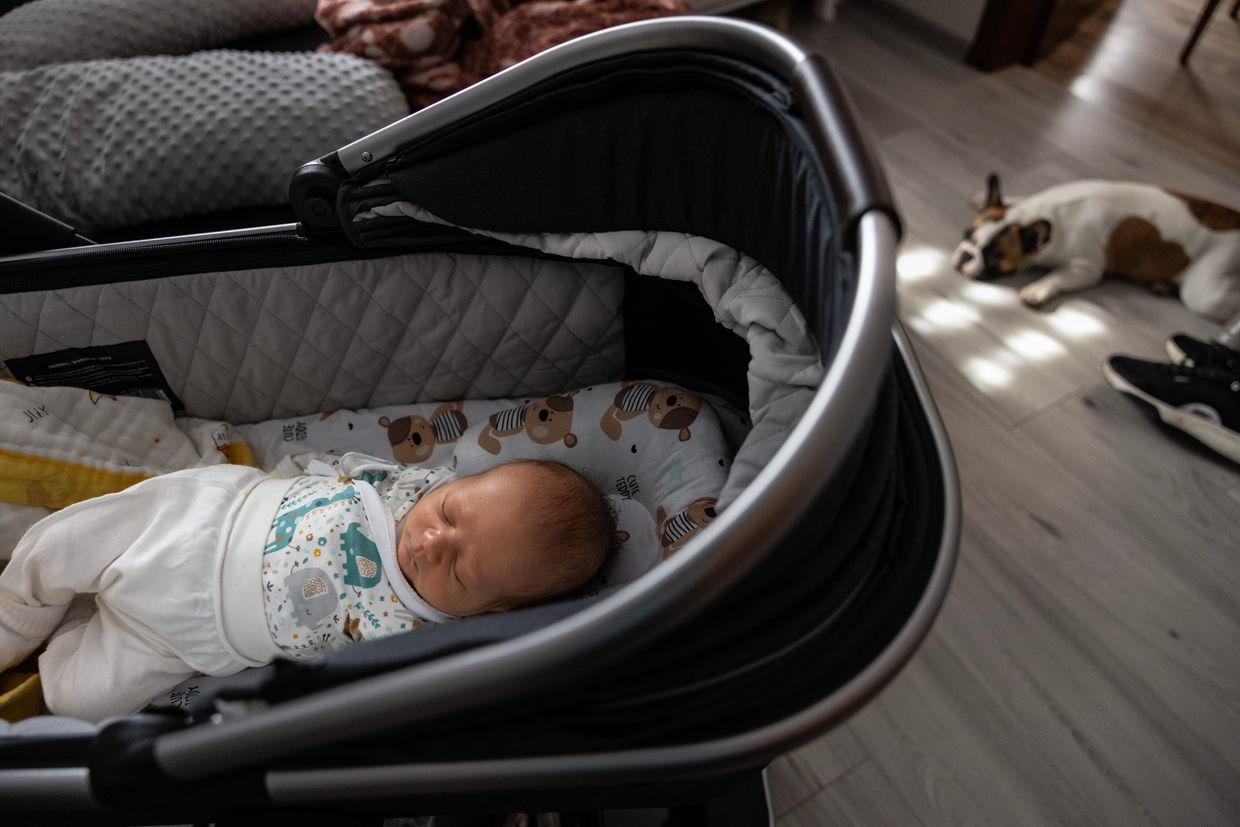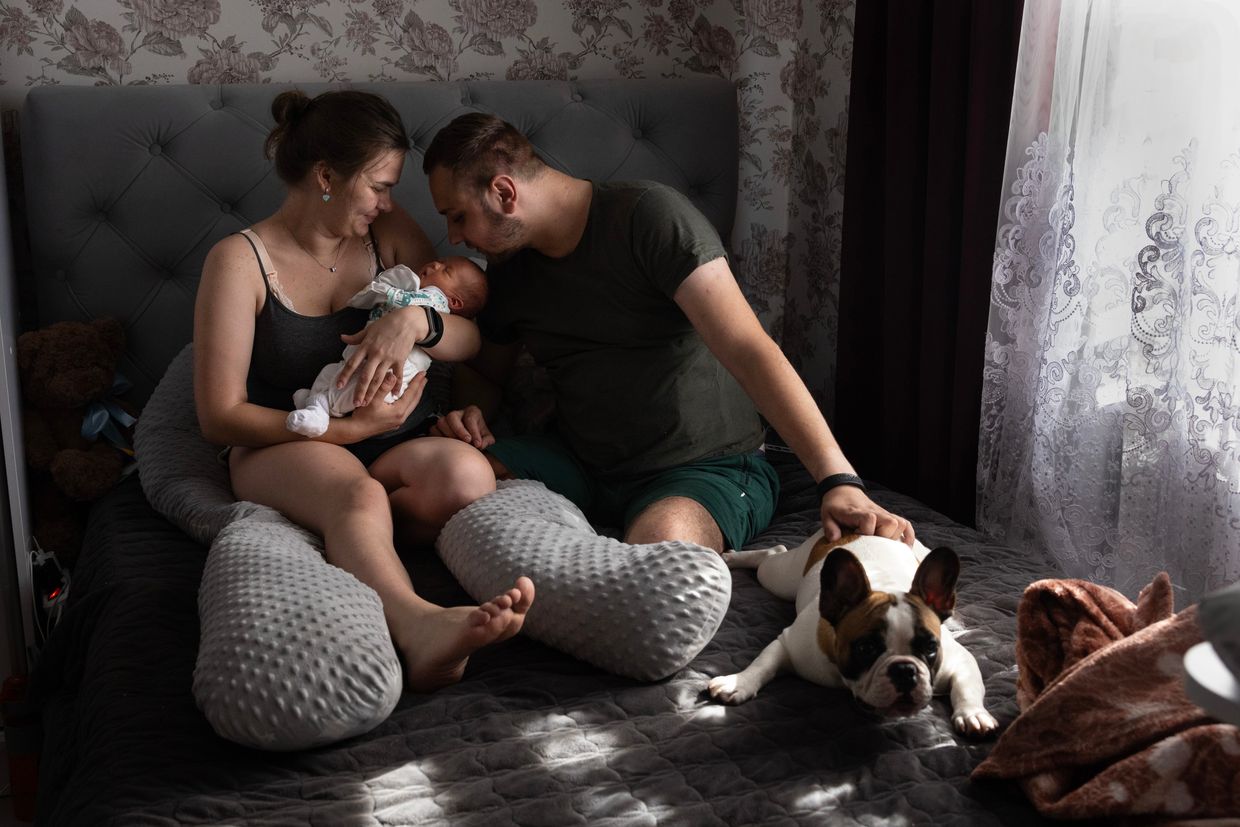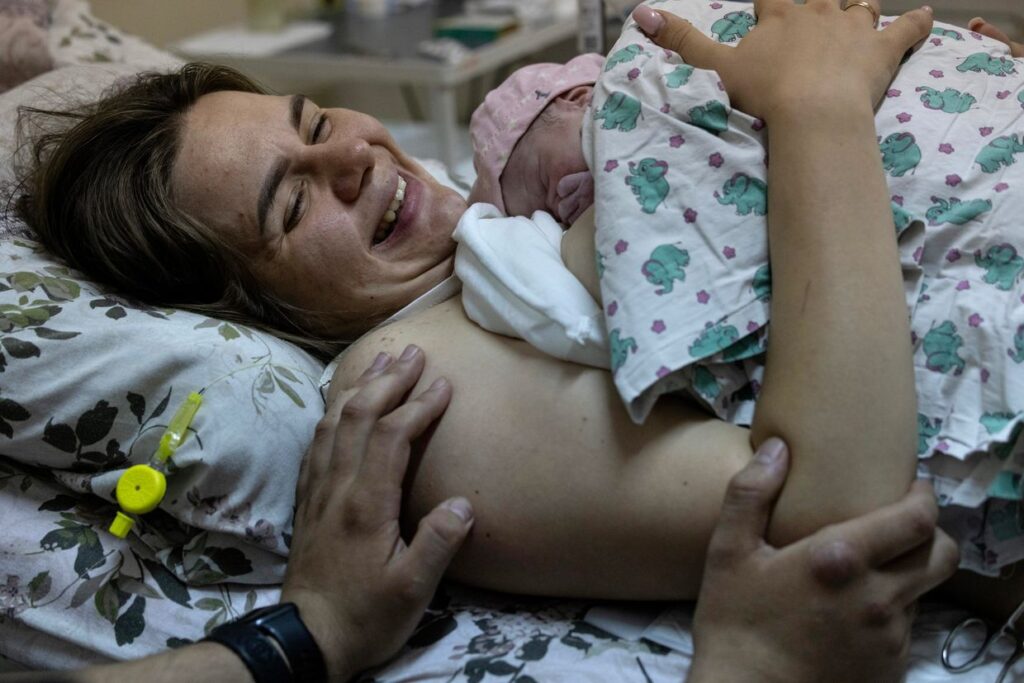Support independent journalism in Ukraine. Join the fight.
Become a member Support us just once
The first time I heard an air raid siren was a few days after my baby was born. We were still in the maternity hospital and I was enjoying a much-needed rest. I anxiously peeked into my baby's bed, afraid that the sound would wake him up, but he didn't notice. He was fast asleep, ignoring the sound.
We live in western Ukraine, which is much safer than other parts of the country. Our region, like other regions, is subject to frequent rolling blackouts due to Russian attacks on Ukraine's energy infrastructure. Fortunately, the number of times our region has been the target of missile and drone attacks in the last two and a half years can be counted on one hand. Air raid sirens are more annoying here than anything else. But even if there are no explosions, there's no need to expose your children to them.
During my stay in hospital, I had to sign a liability waiver acknowledging that I was under no obligation to seek shelter when an air raid siren sounded and that I understood all the potential risks if I did not evacuate.
Preoccupied with the impending birth of my child and the fact that I was already days away from my due date, I hesitated for a moment before signing the liability waiver.
I couldn't help but think that my child somehow sensed the world he'd come into and wanted to remain in the womb for as long as possible.
For now, my children live in blissful ignorance, with no real understanding of war, occupation, air raid sirens, missiles, drones, and the existence of a country called the Russian Federation that is trying to uproot them from their homes, place them in brainwashed Russian homes, and, if that fails, kill them.
Ukraine's prosecutor general reported in early June that more than 800 children have been killed since Russia's war with Ukraine began in 2014, at least 551 of them since the start of full-scale hostilities. More than 19,000 Ukrainian children are known to have been abducted by Russia, according to a government database, a figure that is likely to be much higher once the war ends.
 A baby sleeps in a stroller next to its parents in the village of Pokashchiv, Lutsk Oblast, Ukraine, on August 15, 2023. (Paula Bronstein/Getty Images)
A baby sleeps in a stroller next to its parents in the village of Pokashchiv, Lutsk Oblast, Ukraine, on August 15, 2023. (Paula Bronstein/Getty Images)
The weight of this reality hangs over every new parent in Ukraine: When and for how long should you expose your child to it? Can such decisions mean the difference between life and death?
Meanwhile, children have had little time to accept their lost innocence as they wake up to a new reality with the start of all-out war on February 24, 2022. They continue their education in underground makeshift schools amid continuing shelling. Children who lost limbs in Russian attacks learn to move around with prosthetics. They visit their fathers' graves…
The worst feeling in the world is to look at your children and worry that a normal childhood will be a luxury for them. The constant fear that no matter what you do you can never truly protect them. Fear that you will lose one or both parents. Fear that one day they will recognize the sounds of air defense forces and burst into tears. Fear that such sounds will become so commonplace that they will become an angry reminder of the threat. Fear that daily life will become so dangerous and unlivable that you will have to flee the country…
The horrors are numerous and you must ignore them, not to drown in them. Despite all these horrors, you must continue to live. You must continue to live, understanding that this war will shape your family's entire life in some way.
Like any parent, I often find myself trying to envision my children's future. Our family sometimes jokingly debates whether they should pursue a career in cutting-edge scientific discovery or perform in show business. In the end, we just want our children to be happy and healthy and, above all, with peaceful skies above their heads.
No matter how vivid your imagination, there are aspects of the future you can't understand until you've experienced it. Though we all begin our similar journey towards adulthood, there will always be a generational gap between parents and children.
 A man and his wife hold their newborn baby and a French bulldog puppy in a bedroom at Svitlana's parents' home in the village of Pokashchiv, Lutsk Oblast, Ukraine, on August 15, 2023. (Paula Bronstein/Getty Images)
A man and his wife hold their newborn baby and a French bulldog puppy in a bedroom at Svitlana's parents' home in the village of Pokashchiv, Lutsk Oblast, Ukraine, on August 15, 2023. (Paula Bronstein/Getty Images)
My children's education will probably include drone operation and first aid classes. Compulsory military service will probably become much more standardized, a rite of passage as much as studying for a driver's license. It's impossible not to console myself with the illusion that once the war is over, civilian life will be the same as it was before the full-scale invasion began.
How will history, language and literature classes change in schools? Will my children and other Ukrainian elementary school students develop a deeper understanding of Ukrainian grammar rules when they learn that Russian troops deliberately attacked their teachers in occupied territories? Will their generation resonate with the words of Ukrainian authors like 19th century national poet Taras Shevchenko when they learn that for hundreds of years Russia wanted nothing more than for Ukrainian books to be burned? Will the sacrifices of their forebears, who believed in and fought for the independence of their country, inspire them to become active citizens and work for the betterment of their country?
Russia's war makes Ukraine's future even more uncertain. There is much to be grateful for and much to be hopeful about, but there is also much to worry about. There is also much to be sad about.
In addition to considering factors like finances, lifestyle and education, parents living in wartime Ukraine must also take into account the situation on the front line, the impact of daily Russian attacks on their mental health, the extent to which their city is directly exposed to attack, the impact on the economy and the rapidly changing threat landscape.
All of this makes having a child during wartime a very personal decision and somewhat frightening, but for me, and for many others, it's still worth it.
To know that the bonds of family will always show us the way through a world that is unforgiving and cruel. To know that you will leave a legacy. To know that even as Russia seeks to spread death, you choose to spread compassion and hope.
Editor's note: Opinions expressed in opinion columns are those of the authors and do not necessarily reflect the views of Kyiv Independent.

Kate Tsurkan
Kyiv Independent culture reporter
Kate Tsurkan is a reporter for the Kyiv Independent, where she writes mainly about culture-related topics. Her writings and translations have appeared in The New Yorker, Vanity Fair, Harper's, The Washington Post, The New York Times, and more. She is co-founder of Apophenie Magazine. Read more



